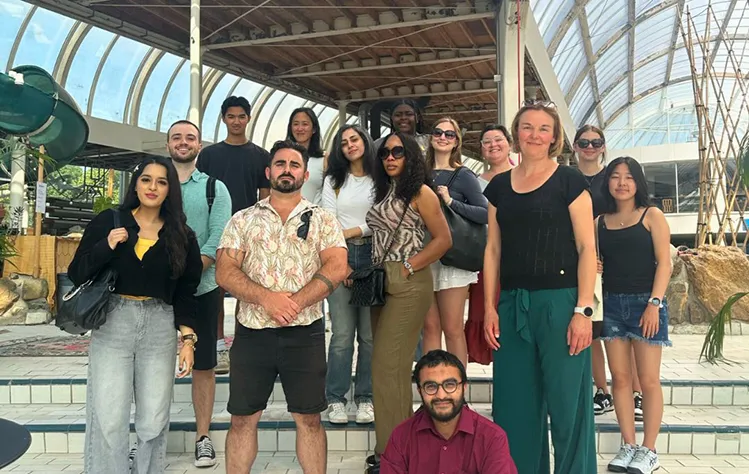BlueCity Rotterdam: Where Circular Economy Comes to Life
June 24, 2025

By Angela Osmond
As part of Webster Leiden’s Circular Economy course with Professor Anke Schuttemeyer, students from the Master of Science in Sustainability Management program recently visited BlueCity in Rotterdam.
The trip gave students a firsthand look at the blue economy, where organizations collaborate by using each other's waste as resources. This concept of intercircularity, with systems constructed on mutual value and cycles of resources, was the central theme of the visit.
The BlueCity guide led students around the building and shared how the space now serves as a living lab for circular entrepreneurship. One interesting example was the journey of a simple coffee ground. In BlueCity, used coffee grounds from one business are collected and used as a growing medium for mushrooms.
These mushrooms are used by Vet & Lazy, a circular brewery, to create special-edition beers — but the cycle doesn’t end there. The wastewater from beer production, which would normally be discarded, is repurposed by the Outlander Materials’ project to create a biodegradable alternative to plastic packaging.
This collaboration among businesses, each closing a loop in someone else’s supply chain, demonstrated how waste can become a valuable asset when systems are designed with circularity in mind.
The journey was a meaningful experience that made the course come alive in tangible ways. What stood out to many students was how BlueCity is not just an aggregation of green startups but an end-to-end ecosystem based on creativity, cooperation and sustainability.
Seeing these principles in action helped close the gap between academic theory and practical application, showing how circular economy models can function in real life. It also sparked a conversation on how intercircular thinking could impact personal problem-solving and sustainable design strategies.
The visit challenged students to go beyond one-off approaches to sustainability and to begin thinking about how whole systems — businesses, materials, communities — can be reconceived to work together in order to create a more regenerative world.
